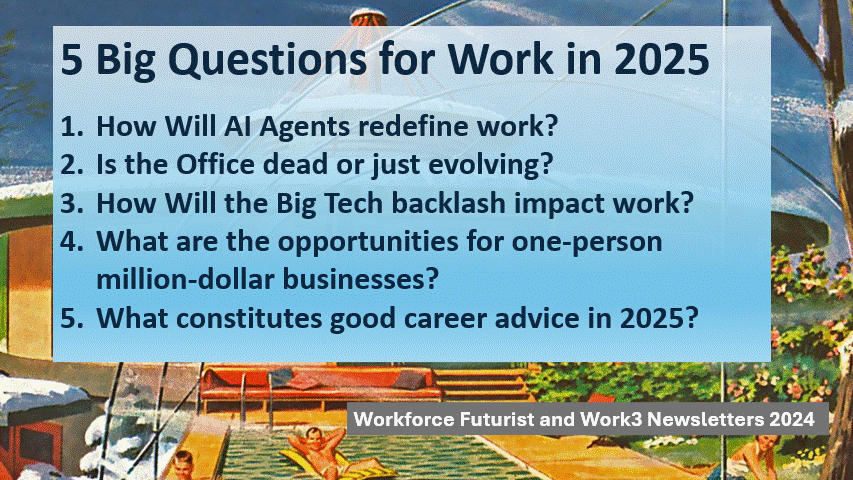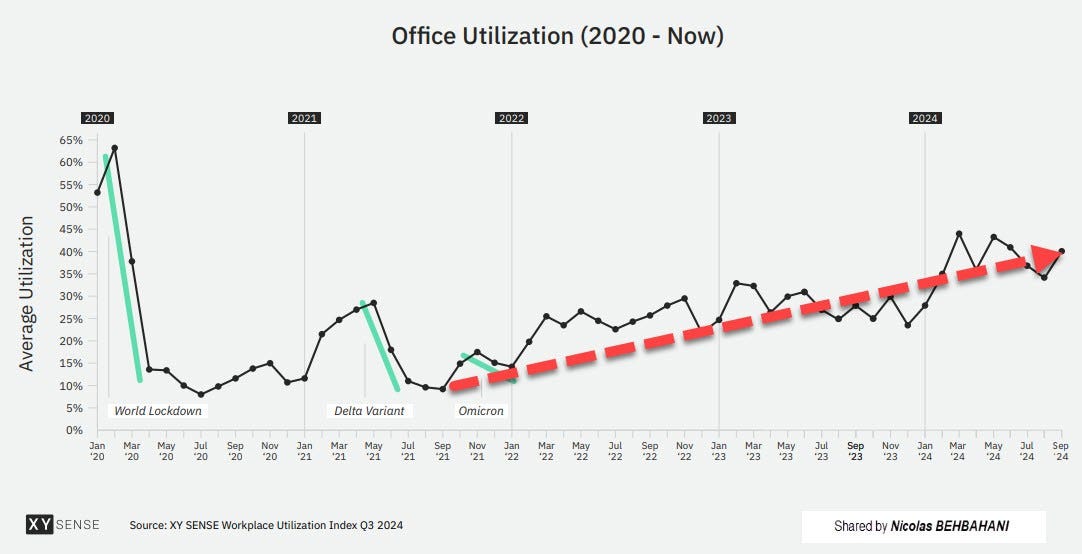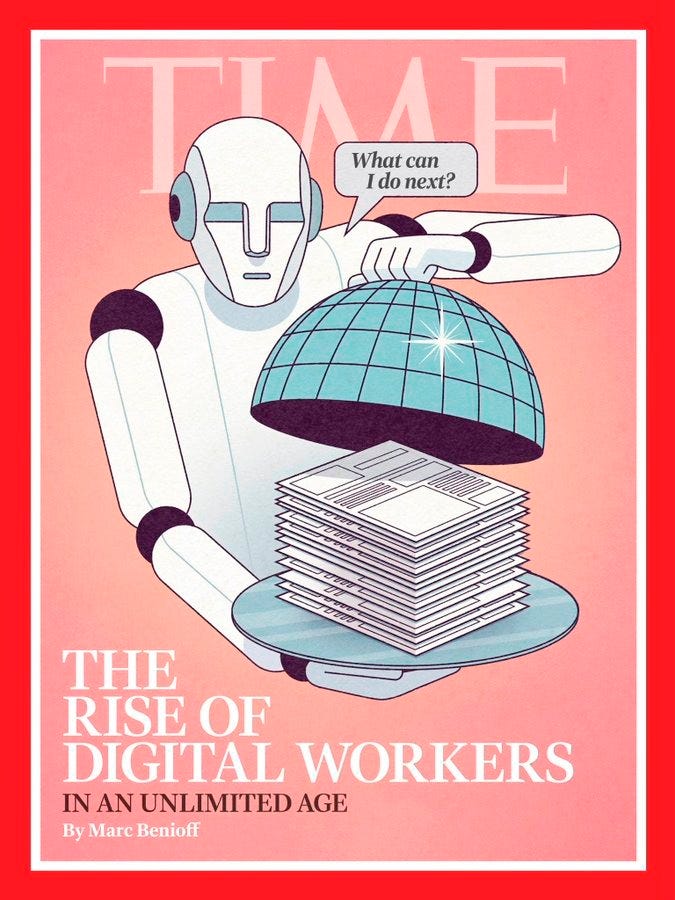5 Big Questions for Work in 2025
From developing 100 different careers and building million-dollar businesses to the rise of AI Agents and the big tech backlash
A couple of weeks ago we gave our view on some of the power dynamics shaping work in 2024, including:-
⛗ Capital 1 - 0 Labour – Mass layoffs masked by the dubious ‘AI inside’.
🤖 Robots 1 - 0 Humans– ChatGPT’s rise and its impact on knowledge work.
👩💼 Salarymen 0 - 1 Freelancers – More freelancers flood the market keeping rates low.
🌎 Anywheres 1 - 0 Somewheres – Remote work vs. location-based jobs.
📴 Technology 1 - 0 Trust – Who controls the apps we rely on?
🤳🏽 Centralised 0 - 1 Decentralised – A liquid workforce challenges the need for a large centralised workforce.
🏠 Office 1 - 0 Home – The RTO mandates that left remote advocates reeling.
We will be monitoring and documenting how these scores might change throughout 2025. As we discussed on our Webinar last week (which I forgot to record 🙈) here are some of the Questions for Work in 2025. Look out for opportunities to join more of our community webinars early next year.
1- How Will AI Agents redefine work?
In 2024 we scratched the surface of AI Agents, analysing some of the hottest startups developing AI workers (think of Business Development Reps, Customer Care). We also deep-dived on how each individual worker is going to have access to their own ‘personal’ workforce, customised on specific tasks, datasets and so on.
Developments in this area will see multimodal AI coming into play (voice/video interaction and assistance) and further evolution of capabilities.
However, we need to see how this type of usage will be coordinated by companies, or if it will be very fragmented and delegated to individuals. A recent study found that over 60% of employees ‘bring their own AI’ to work meaning that they are self-managing and choosing how to get that help.
Quality vs Quantity will become a real debate. We expect some of the hype coming down and starting to be confronted with reality: how much of the generative AI work is actually valuable or more similar to bad cholesterol ‘clogging up the web’s arteries’.
More quality will come through the real analysis and mapping of processes and workflows, and measurement of AI Agents will be a new type of KPI (and matter of startup/SaaS focus).
Unhealthy monitoring of employee productivity could come along with that. The pace of innovation and skill augmentation should be on the radar of HR teams which will need to augment themselves too.
2- Is the Office dead or just evolving?
We’ve decided that we’re going to return to being in the office the way we were before the onset of Covid. This will help staff be better set up to invent, collaborate, and be connected enough to each other. CEO Amazon
The World’s 2nd largest employer with 1.5 million employees ordered their staff back to the office 5-days-a-week. Is a hybrid policy past its Prime?
Amazon want to reduce the number of managers, decrease bureaucracy and operate like the world’s largest startup. Many other large employers have followed suit including Uber, Twitter, Starbucks, Meta, Google, Goldman Sachs.
Is such a big move based on evidence that working in the office increases workforce productivity?
Not really.
Despite the work of tens of thousands of researchers who dedicate their careers to management practices, the translation of this research into corporate decision-making is very patchy.
Without robust, relevant external evidence to make a bold move on organisational change like this, the best available evidence is internal research conducted by analytics teams.
So what drives RTO mandates?
Power-politics or Corporate Peacocking 🦚 - a continuation of Command and Control management techniques developed for the economy of the 20th Century. “Productivity can only be maintained where I can see you working”
Real-estate investments - saving face with shareholders on a staggering $1.5 trillion US commercial real estate debt. Justification of new shiny glass offices and fine herbal tea stations. (Read more in Peak Office article.)
The rhetoric of RTO mandates can also provide linguistic cover for redundancies and lay-offs, where employers have over-hired and respond to technology innovation.
The use of the office is not dead, in fact office utilisation appears to be creeping up from the Covid-era, with some researchers reporting a 42% year-over-year increase.
In 2025, many knowledge workers will still work in offices for some days of the week, and of course some enjoy the social interaction.
The question in competitive industries is will this actually increase workforce productivity?
Workforce data that shows RTO mandates increase the flight-risk (attrition) for high-performers, women, and, millennials. (Source - Gartner). The rise of People Analytics in HR functions (see David Green’s excellent monthly Best HR & People Analytics articles) has seen two-tier organisations, those with, and those without a savvy analytics function. Traditional HR departments continue to struggle with employee relations and human supply chain issues.
3- How Will the Big Tech backlash impact work?
Traditionally a rich man seeking more influence will buy a newspaper:
Marc Benioff owns Time Magazine
Jeff Bezos bought The Washington Post in 2013
Elon Musk didn’t buy a paper, he bought the whole publication platform, Twitter, for $43 billion.
We are now seeing Tech owners using their publications to sell messaging for their products. The issue is that their products will transform our societies which need a good quality debate. Not one where the agenda is led by narrow vested interests.
There are also anti-trust actions and lawsuits around the World against monopolistic tendencies of large tech firms. They need all the help they can get to defend their digital moats.
Musk employs about 135k workers directly, and his US Government Efficiency remit is 2.2 million civilian workers. Whatever happens with his public sector work and future job displacement, Shiny Tech will be both an enabler and deflector -> this will be a theme for Politics 2025.
Since industrialisation there has always been the fear that others will take our jobs.
‘The Robot will take our jobs’ is an old one. The word ‘robot’ was introduced in Karel Čapek's Czech play, ‘R.U.R.’(‘Rossum's Universal Robots’) over 100 years ago. The Czech word is based on a Slavic root ‘rob’ meaning ‘forced labor’. This fear has been remarkably easy to manipulate by interested parties whether the target is immigrants, robots or chatbots.
What might a Tech Backlash look like in 2025 in the World of Work?
Bossware fight back - workers are increasingly being spied on at work - from keystrokes to browser activity and location trackers. There is a worker fight-back using technology to fight technology. Where bosses are tracking mouse-activity as an indicator of work output (don’t get me started on this) workers have been buying ‘mouse🐭 jigglers’ devices that mimics movement to give the impression you are working.
Organised Labour - we had arguably the first ever workers strike against AI, by the actors and writers of Hollywood. Thankfully this was resolved fairly quickly and we can continue to watch Netflix-by-numbers boxsets. Workers protesting against the introduction of new technology is a classic plot in the history of work and how successful they are will depend on the latest Capital Vs Labour scores.
More bloody protests - society schisms are getting bigger along different fault lines, between the old and the young, the rich and poor, those who can work anywhere and those who need to work somewhere. There has always been anti-capitalism protests with some ominous recent signs these are becoming more bloody.
Platform Pilgrims - An exodus from social media platforms where the users object to the owner. Bluesky now has 25 million users as people gradually leave Twitter.
People just don’t want to work - 75% of Generation Z have no plans of going full-time for their whole lives - according to a survey in Dazed magazine.
4 - What are the opportunities for one-person million-dollar businesses?
Whilst some job tasks may start to be replaced, and some junior / entry level roles be replaced (or not hired for) in may areas, there’s a big potential upside to look out for: one-person businesses.
Already during COVID the rise of registered businesses skyrocketed, and we’ve seen the plethora of AI products being built in the last year, either using AI as the backbone, or using AI to help build / program the technology.
This is a huge shift / enabler / democratization of the startup process for three main reasons:
1 - Removal of Barriers to Entry: Less capital is needed to build, access to AI is cheaper than ever and will become even more so.
2 - Faster Time to Market - This access enables quicker iterations and development, meaning idea to product will take less time.
3 - More Efficiency and Flexibility - Either through Agents, self-augmentation (expansion of skills, i.e. the Founder that codes, markets and sells his product) or through the increasing use of fractional and freelance work, it will cost less to ship and to maintain companies.
Whilst we don’t have certainty on which ideas will be the one-million dollar businesses, we’re sure of one thing: there will be many more attempts in this gold-rush like era, including many ‘pick and axe’ kind of services. Much like in other technological advances (and bubbles) many will die on that hill but useful learnings will come, and be used for others’ success.
AI-powered ‘X’ for unexplored areas is going to be an obvious take, so the best advice is to go a level deeper and look for problems in the ‘real world’ through audience analysis in communities like Reddit, and turn product develop upside down: build the audience first, then test and the develop.
5 - What constitutes good career advice in 2025?
The average 20th-century worker studied for 20 years, worked for 45 years, retired at 65, then died 14 years later.
An industrial mindset told us when we could learn, earn and when we had to stop.
Today, the average life expectancy of women in France, Italy and Japan is past 86 years.
Babies born today in richer countries are expected to live past 100 years old
Thinking about careers in 2025 and beyond requires a different mindset to the last century.
Here are some thoughts:
Come on baby light my FIRE🔥 - strive for Financial Independence and take control of your work and finances. Whether you are 20, 40 or 60. Start saving up for a fund that pays your expected expenses when you stop getting paid for work.
Think like a business, $me myself.Ltd and I.Corp - develop your personal brand, develop a diverse sales pipeline, assess supply and demand etc
Do work that gives you fulfilment and aligns with your values - this is the goal isn’t it? Paid, unpaid, recognised, invisible. Retirement becomes irrelevant because you will not want to stop.
Stay healthy mentally and physically - obviously, but don’t burnout because of your work.
Develop 100 different careers and lives - we will be constantly working on projects, caring, convalescing, earning and learning at different rates. We will have 100 different careers and 100 different lives.
Commit to Lifelong learning - no school, mentor, university, employer will teach you what you need over a long life. Stay curious.
Nurture relationships and networks - the number of stable relationships a person can cognitively maintain is 150, according to research by Robin Dunbar. This number hasn’t changed in the era of social media. So have some fun finding ‘your people’, your tribe whether at work, in your community, online or IRL.
And finally, ignore all career advice.
There are many more questions for 2025 that we will be covering next year in our weekly updates.
What are your Big Questions for Work in 2025?
Write to us, or add to comments…
Happy Christmas! 🎄
Curiouser, and curiouser,
Andy and Matteo









